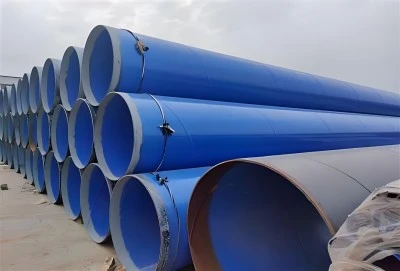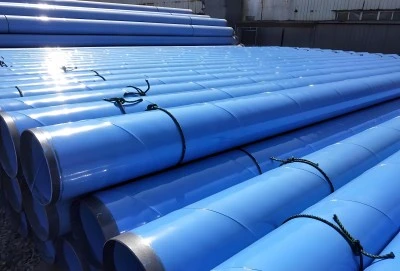Epoxy Coating and Its Role in Modern Construction
Epoxy coating is a revolutionary technique that has revolutionized the construction industry, particularly in the realm of pipe manufacturing. This process involves applying a protective layer of epoxy resin to the surface of carbon steel pipes, creating a barrier that shields the underlying metal from corrosion, abrasion, and chemical damage.
The application of epoxy coating to carbon steel pipes is a meticulous process that requires precision and expertise. It typically involves the following steps:
- Surface preparation: The steel pipe is thoroughly cleaned and prepared to ensure optimal adhesion of the epoxy coating.
- Primer application: A specialized primer is applied to enhance the bond between the steel surface and the epoxy coating.
- Epoxy application: The epoxy resin is carefully applied to the prepared surface, ensuring even coverage and thickness.
- Curing: The coated pipes undergo a curing process to allow the epoxy to harden and form a durable protective layer.
- Quality control: Rigorous testing is conducted to ensure the integrity and performance of the epoxy coating.
The result is a pipe that combines the strength and versatility of carbon steel with the superior protection offered by epoxy coating. This synergy of materials creates a product that is exceptionally well-suited for a wide range of applications in modern construction and infrastructure projects.
In recent years, the adoption of epoxy coated pipes has grown exponentially across various sectors, including:
- Water treatment and distribution systems
- Oil and gas pipelines
- Industrial processing facilities
- Marine and offshore structures
- Underground utility networks
The versatility and reliability of epoxy coated carbon steel pipes have made them an indispensable component in the construction of resilient and long-lasting infrastructure. As urbanization continues to accelerate and the demand for robust utility networks grows, these pipes are poised to play an increasingly crucial role in shaping the cities and communities of tomorrow.
Key Advantages of Epoxy Coated Pipes for Industrial Use
The adoption of epoxy coated carbon steel pipes in industrial applications has been driven by a multitude of benefits that address the unique challenges faced by various sectors. Let's explore some of the key advantages that make these pipes an optimal choice for industrial use:
1. Enhanced Corrosion Resistance
One of the most significant advantages of epoxy coated pipes is their exceptional resistance to corrosion. The epoxy layer acts as a barrier, preventing moisture, chemicals, and other corrosive elements from coming into direct contact with the steel surface. This protection is particularly valuable in industries that deal with aggressive substances or operate in harsh environments, such as:
- Chemical processing plants
- Wastewater treatment facilities
- Offshore oil and gas platforms
- Mining operations
By mitigating the risk of corrosion, epoxy coated pipes help extend the lifespan of industrial infrastructure, reduce maintenance costs, and minimize the likelihood of catastrophic failures due to material degradation.
2. Improved Flow Efficiency
The smooth surface created by the epoxy coating significantly reduces friction within the pipe, leading to improved flow characteristics. This enhanced flow efficiency translates to several benefits for industrial applications:
- Reduced pumping costs due to lower energy requirements
- Increased throughput capacity
- Minimized risk of blockages and sediment buildup
- Enhanced overall system performance
These improvements in flow efficiency can result in substantial cost savings and operational advantages for industries that rely on the transportation of fluids or gases through pipe networks.
3. Chemical Resistance
Epoxy coatings can be formulated to provide resistance against a wide range of chemicals, making them ideal for use in industries that handle corrosive or reactive substances. This chemical resistance helps protect the underlying steel from degradation and ensures the integrity of the pipe system even when exposed to harsh chemical environments.
Industries that particularly benefit from the chemical resistance of epoxy coated pipes include:
- Petrochemical refineries
- Pharmaceutical manufacturing facilities
- Food and beverage processing plants
- Pulp and paper mills
4. Temperature Tolerance
Epoxy coated carbon steel pipes can be engineered to withstand a wide range of temperatures, making them suitable for both high-temperature and cryogenic applications. This temperature tolerance ensures that the pipes maintain their structural integrity and protective properties even under extreme thermal conditions, which is crucial for industries such as:
- Power generation plants
- Industrial refrigeration systems
- Heat exchange networks
- Cryogenic gas transportation
5. Abrasion Resistance
The durable epoxy coating provides excellent protection against abrasion, making these pipes ideal for applications involving the transport of abrasive materials or slurries. This abrasion resistance helps maintain the integrity of the pipe's inner surface, preventing premature wear and extending the overall lifespan of the piping system.
Industries that benefit from the abrasion resistance of epoxy coated pipes include:
- Mining and mineral processing
- Cement manufacturing
- Dredging operations
- Sand and gravel handling facilities
6. Cost-Effectiveness
While the initial cost of epoxy coated carbon steel pipes may be higher than that of traditional uncoated pipes, the long-term cost savings are substantial. The enhanced durability, reduced maintenance requirements, and extended lifespan of these pipes result in a lower total cost of ownership over the life of the infrastructure. This cost-effectiveness makes epoxy coated pipes an attractive option for industrial projects with long-term operational considerations.
7. Versatility in Application
Epoxy coated pipes can be customized to meet the specific requirements of various industrial applications. The coating thickness, formulation, and application method can be tailored to address unique challenges posed by different industries and operating environments. This versatility allows for the optimization of pipe performance across a wide spectrum of industrial use cases.
The combination of these advantages makes epoxy coated carbon steel pipes an invaluable asset for industrial applications, offering a robust and reliable solution that meets the demanding requirements of modern industrial infrastructure.
Why Choose Epoxy Coated Carbon Steel Over Traditional Materials?
As the construction and infrastructure industries continue to evolve, the choice of materials plays a crucial role in determining the longevity, performance, and sustainability of projects. Epoxy coated carbon steel pipes have emerged as a superior alternative to traditional materials, offering a unique combination of benefits that address the challenges faced by modern infrastructure development. Let's explore the compelling reasons why epoxy coated carbon steel is increasingly preferred over conventional options:
1. Superior Corrosion Protection
One of the primary advantages of epoxy coated carbon steel pipes is their exceptional resistance to corrosion. Unlike traditional materials such as uncoated steel or iron, which are vulnerable to rust and degradation, epoxy coated pipes provide a robust barrier against corrosive elements. This enhanced protection translates to:
- Extended service life of pipe networks
- Reduced maintenance and replacement costs
- Improved water quality in distribution systems
- Enhanced reliability in critical infrastructure
The superior corrosion resistance of epoxy coated pipes makes them particularly valuable in applications where exposure to moisture, chemicals, or harsh environmental conditions is a concern.
2. Strength and Durability
Carbon steel, as the base material, offers excellent mechanical properties that are further enhanced by the protective epoxy coating. This combination results in pipes that exhibit:
- High tensile strength and structural integrity
- Resistance to external pressures and loads
- Ability to withstand extreme temperatures and pressure fluctuations
- Long-term stability and performance
The durability of epoxy coated carbon steel pipes ensures that infrastructure built with these materials can withstand the test of time and environmental challenges, reducing the need for frequent repairs or replacements.
3. Versatility in Application
Epoxy coated carbon steel pipes offer remarkable versatility, making them suitable for a wide range of applications across various industries. Their adaptability stems from the ability to customize the epoxy coating to meet specific project requirements. This versatility allows for the use of epoxy coated pipes in diverse settings, including:
- Potable water distribution networks
- Wastewater treatment facilities
- Oil and gas transportation pipelines
- Industrial processing plants
- Marine and offshore structures
- Underground utility corridors
The ability to tailor the properties of epoxy coated pipes to suit different environments and operational demands makes them a preferred choice for complex infrastructure projects.
4. Cost-Effectiveness
While the initial investment in epoxy coated carbon steel pipes may be higher than some traditional materials, the long-term cost savings are significant. The extended lifespan, reduced maintenance requirements, and improved performance of these pipes contribute to a lower total cost of ownership over the life of the infrastructure. Factors that contribute to the cost-effectiveness of epoxy coated pipes include:
- Reduced frequency of pipe replacements
- Lower maintenance and repair costs
- Improved energy efficiency due to better flow characteristics
- Minimized risk of costly failures or leaks
For projects with long-term operational considerations, the economic benefits of choosing epoxy coated carbon steel pipes can be substantial.
5. Environmental Sustainability
As environmental concerns continue to shape the construction industry, the sustainability aspects of building materials have become increasingly important. Epoxy coated carbon steel pipes offer several environmental advantages over traditional materials:
- Reduced material waste due to longer service life
- Lower energy consumption in production compared to some alternative materials
- Potential for recycling at the end of the pipe's useful life
- Minimized risk of contamination in water distribution systems
These environmental benefits align with the growing emphasis on sustainable infrastructure development and can contribute to achieving green building certifications.
6. Improved Flow Characteristics
The smooth surface provided by the epoxy coating results in superior flow characteristics compared to traditional pipe materials. This improved flow efficiency leads to:
- Reduced pumping costs and energy consumption
- Increased system capacity and throughput
- Minimized risk of scaling and biofilm formation
- Enhanced overall system performance
The hydraulic advantages of epoxy coated pipes make them particularly attractive for applications where efficient fluid or gas transport is critical.
7. Resistance to Chemical and Microbial Attack
Epoxy coatings can be formulated to provide resistance against a wide range of chemicals and microbial growth. This resistance is particularly valuable in applications where pipes are exposed to aggressive substances or environments prone to biological fouling. The benefits of this resistance include:
- Maintained water quality in distribution systems
- Extended service life in chemical processing applications
- Reduced risk of contamination in sensitive environments
- Improved safety and reliability in hazardous material transport
The ability to withstand chemical and microbial attack makes epoxy coated carbon steel pipes a preferred choice in industries where material integrity is paramount.
In conclusion, the unique combination of strength, durability, versatility, and performance offered by epoxy coated carbon steel pipes positions them as a superior alternative to traditional materials in many infrastructure applications. As the demands on our built environment continue to grow, the adoption of these advanced pipe solutions will play a crucial role in creating resilient, efficient, and sustainable infrastructure for the future.
The construction industry is witnessing a paradigm shift towards more durable, efficient, and sustainable materials. Epoxy coated carbon steel pipes embody this shift, offering a solution that addresses the complex challenges of modern infrastructure development. As we continue to build and renovate our cities, utilities, and industrial facilities, the role of these innovative pipes in shaping a more resilient and sustainable future cannot be overstated.
For more information on how epoxy coated carbon steel pipes can benefit your next project, please don't hesitate to reach out to our team of experts at info@longma-group.com. We're here to help you build a stronger, more efficient future.














